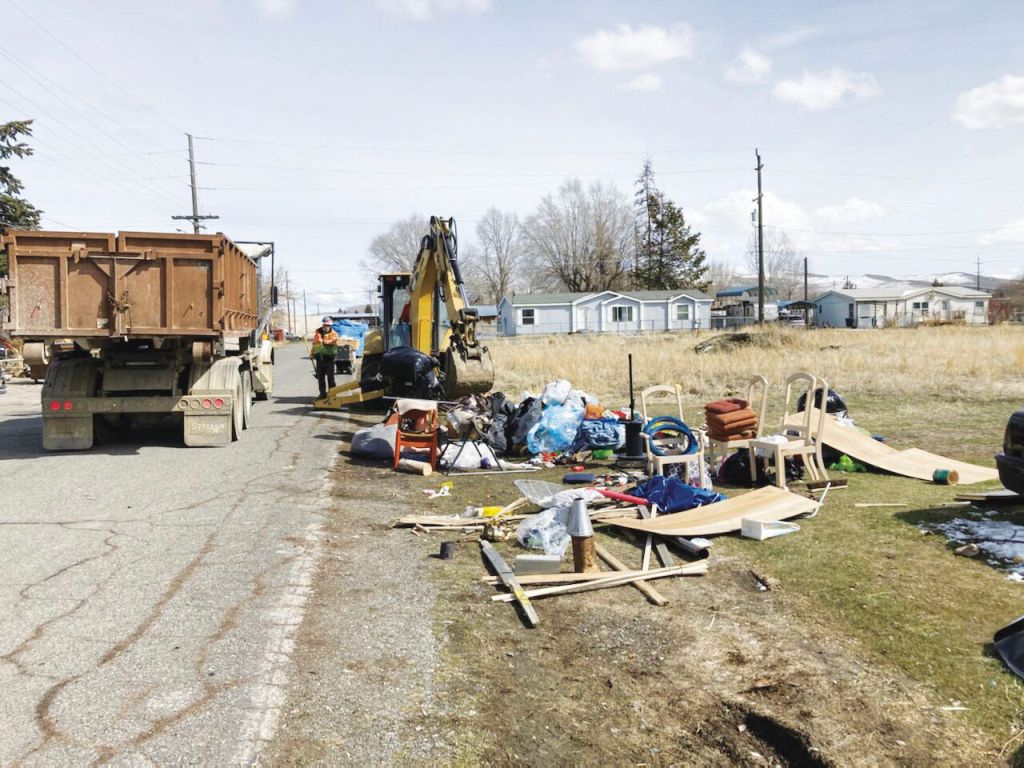Baker City police dismantle homeless camp
Published 7:00 pm Thursday, March 30, 2023

- Baker City police and public works employees remove items from a homeless camp Monday, March 27, 2023, on Court Avenue between 15th and 16th streets, which is a residential zone.
BAKER CITY — Baker City Police called in a backhoe from the city’s public works department to move items from a homeless camp into a dumpster on the west side of town on Monday, March 27.
The camp violated the city’s camping ordinance, Police Chief Ty Duby said. The City Council approved that ordinance in May 2022.
The camp was on the south side of Court Avenue between 15th and 16th streets, and it partially blocked a public alley, Duby said. The camp included several chairs and pieces of wood and plastic tarps fashioned into a makeshift shelter.
He said the city had received multiple complaints about the camp in the past few days, including one report from a driver that someone had lit a cooking fire.
The property is in a residential zone, and the camping ordinance prohibits people from staying on public property in residential zones.
The ordinance allows camping on public property, with time restrictions, in general commercial, general industrial and light industrial zones. The ordinance prohibits camping in those areas between 6 a.m. and 8 p.m.
The ordinance applies only to public property. People are not allowed to camp on someone’s property, at any time, regardless of the zone.
Duby was prompted to propose the ordinance after the Oregon Legislature passed a bill in 2021 stating that cities and counties with ordinances regulating camping on public property must ensure those ordinances are “objectively reasonable as to time, place and manner with regards to persons experiencing homelessness.”
The state law also allows unhoused people to challenge in court such city or county ordinances.
The ordinance specifically prohibits overnight camping in parks, including the Leo Adler Memorial Parkway, and in several other public properties, among them within 150 feet of any school, preschool or child care center, or at the Baker Heritage Museum at 2480 Grove St., the Baker County Courthouse, Sam-O Swim Center, the YMCA gym on Church Street and the YMCA Fitness Center on Pocahontas Road.
Duby said it appears two people were living in the camp, Kristi Ann Moudy-Koos and Lucas Buddy Lee Gwin.
In August 2022 the city tore down a home that Gwin owned in east Baker City after Brent Kerns, Baker County Justice of the Peace, deemed the home a “chronic neighborhood nuisance” under a 2019 revision to the city’s property maintenance ordinance.
The city had paid to remove trash and debris from outside Gwin’s home four times from 2017-2021.
Duby said police officers had spoken with Gwin and Moudy-Koos and asked them to gather any items they needed before the city removed the camp.
Dawn Kitzmiller, the city’s building official, determined that Gwin’s home had multiple structural problems that clearly made it a dangerous building.
A camper’s perspective
Moudy-Koos, clad in at least three coats, stood in the falling snow in the parking lot behind the Baker Web Academy building on Broadway Street just west of the railroad tracks.
The site is about five blocks from the camp police removed the day before.
Moudy-Koos uses a roll cart to move her possessions, including tarps beneath which she sleeps and uses to get out of the weather.
Moudy-Koos, 46, said she was born and raised in Baker City and has lived on the streets for much of the past seven years.
“There’s no reason I should be out here,” she said.
Moudy-Koos said she has a few friends and family in town but no options for permanent housing. She said she receives $963 per month from Social Security disability.
“I need a stable place to be, but nobody will rent to me,” she said.
Moudy-Koos said she understands the city has a camping ordinance, but she feels she has been harassed.
She said she has serious health problems.
“I don’t know what to do,” she said.
Cleaning up
Duby said Baker City police officers talked with Moudy-Koos and Gwin and asked them to sort through the items in the camp so they could take what they need, such as a tent and sleeping bags.
“The things they need to survive outside,” Duby said.
He said the police department has previously given Moudy-Koos a tent, a sleeping bag and a suitcase for her clothes.
The legal problems arise, Duby said, when people either set up a camp in a residential area, or they don’t comply with the camping ordinance’s time restrictions, or they accumulate volumes of what he called “trash” in addition to tents and sleeping bags.
“The piles just get bigger and bigger,” he said. “It’s not unlawful to be homeless and live outside, but I’m not going to allow an encampment.”
Besides violating the city’s ordinance, camps also cost the city money to collect and haul away the items.
Duby said police have talked multiple times with Moudy-Koos and Gwin about the ordinance when they set up a camp at other locations, including at 13th and G streets and in the parking lot at the Department of Human Services building on 10th Street.





